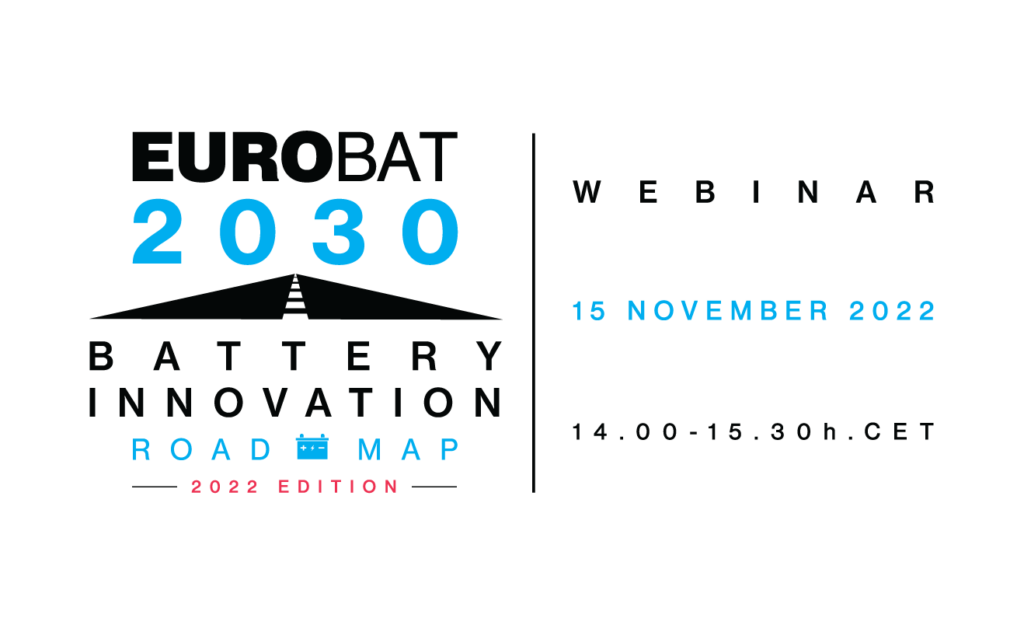EUROBAT webinar showcases battery innovation and the contribution of batteries to the EU’s ambitious decarbonisation agenda

On 15 November 2022, EUROBAT welcomed more than 220 key stakeholders from the European and global battery industry, value chain, academia and policy community to its ‘Battery Innovation Roadmap 2030 2.0’ webinar.
The event, which launched the updated EUROBAT Battery Innovation Roadmap 2030, featured a keynote address by the European Commission’s Jens Bartholmes before EUROBAT members presented the Innovation Roadmap per application, including the best available battery technologies and how they contribute to the EU’s decarbonisation agenda.
Opening the webinar with his keynote speech on ‘The role of batteries in the green and digital transition in Europe’, Jens Bartholmes, Policy Officer ‘Innovation, Research, Digitalisation, Competitiveness’ (ENER.B.5) at the European Commission, said: “When developing batteries of the future and the whole battery value chain, we have to get production, but also the skill and the best talents, if not back then at least build them up in Europe. We need to take another leap from made in Europe to invented in Europe.”
Following the keynote speech, the EUROBAT ‘Battery Innovation Roadmap 2030 2.0’ was introduced by Bernhard Riegel, Director Research & Development, Hoppecke. He said: “All battery technologies are complementary with specific features and significant development potential. Developing all battery chemistries will maximise the contribution to zero pollution targets, but new technologies are also required.”
Presenting the innovation areas:
- Christian Rosenkrantz, Vice President Industry & Government Affairs EMEA, Clarios, presented innovations in energy storage for the decarbonisation of the transportation sector, noting that by 2030, 70% of new vehicles will be electrified, with a further 20% being mild or full hybrid.
- Holger Fricke, Director Basic Research R&D EMEA, Exide Technologies, presented UPS, telecom and off-grid innovations in stationary energy storage, saying that the mainstream technologies in 2030 will be lead and lithium batteries, with some niche applications for sodium- and nickel-based batteries.
- Valentin Rota, Director Sales and Business Development, Freyr, presented ‘behind the meter’ (BTM) and ‘front of the meter’ (FTM) energy storage applications, saying that Battery Energy Storage System deployments are growing at pace and will play a vital role in variable renewables grid integration.
- Andrea Saletti, Technical Director, Midac, presented innovations in material handling, logistics and off-road transportation applications, noting the key performance indicators and innovation potential for lead and lithium batteries in these areas, including high charge/discharge rate, cycle life and power density (lithium) and recyclability, investment cost and extreme temperature performance (lead).
The webinar concluded with a Q&A with the speakers.
The ‘Battery Innovation Roadmap 2030 2.0’ White Paper is an update of the original 2020 publication, accounting for the latest technological developments and changes in the EU’s policy objectives. The revised Roadmap reflects the technological realities and potential of the best available battery technologies and how they can contribute to the EU's decarbonisation agenda.
Download the EUROBAT ‘Battery Innovation Roadmap 2030 2.0’.
Download the presentations.
Watch the webinar.
About EUROBAT:
EUROBAT is the leading association for European automotive and industrial battery manufacturers, covering all battery technologies, and has more than 50 members. The members and staff work with all policymakers, industry stakeholders, NGOs and media to highlight the important role batteries play for decarbonised mobility and energy systems as well as all other numerous applications.